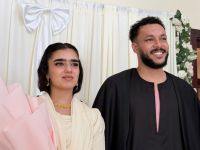Qatar Computing Research Institute inspires local youth about relevance of computing

Qatar Computing Research Institute (QCRI), a member of Qatar Foundation for Education, Science and Community Development (QF), organised a ‘Coding is Cool’ workshop for 98 students from eight independent and private schools in Qatar to encourage interest in the field of computer science.
The event, held at the Qatar National Convention Centre and on the side-lines of QCRI’s annual meeting with the Computer Science and Artificial Intelligence Laboratory at Massachusetts Institute of Technology (CSAIL), was part of a secondary-school student outreach initiative.
Aimed at inspiring students to explore computer science as potential careers and develop their interest in real-world applications, the event supported Qatar Foundation’s mission to build capacity in science and research in Qatar from a young age as part of a commitment towards realising the Qatar National Vision 2030.
To explain the programme, Dr Eman Fituri, Director of Educational Initiatives at QCRI, said: “By organising our first ‘Coding is Cool’ workshop, we hope to inspire and educate young people about the importance of being able to code by demonstrating some of the technologies that are being developed at QCRI, and also by giving them hands-on experience with the power of code that works at the back end of those demonstrations.”
Professor Daniela Rus, Director of CSAIL, a great proponent of introducing programming as part of the school system, was the keynote speaker. The event featured two inspiring presentations by Carnegie Mellon University in Qatar Alumni Hanan Alshikhabobakr – a 2013 Google scholarship recipient and founder of Qatar Robotics Institute for Development; and Ahmad Al-Salama, who works at GE, leading efforts to rollout enterprise resource planning systems across different sites in the Middle East North Africa region.
Highlights of the event included demonstration sessions, where students were given the opportunity to meet and interact with researchers, ask questions, and gather first-hand knowledge of the latest technological innovations made possible by programming.
The demos showcased current research underway at QCRI, including a Braille keyboard – an application for smartphones that helps the visually impaired to type quickly and efficiently; a Kinect-based programme for exercise for the elderly based on fitness level; a state-of-the-art automated transcription system for Modern Standard Arabic (QCRI Advanced Transcription System – QATS); and the MicroMappers platform for rapidly assessing humanitarian disaster damage and the resulting needs, and advanced 3D video applications. Students were also able to see a live demonstration of cube robots and printable robots developed at CSAIL.
One of the students commented: “I liked the little robot squares that could hook onto each other. I think that this simple robot can actually be used in many ways to help out with everyday tasks. I enjoyed seeing how that worked and I would like to learn how to use and make it myself.”
The eight schools that participated were: Tarek bin Zyad Independent Secondary School for Boys, Jassim bin Hamad Independent Secondary School for Boys, Rawda bint Mohamed Independent Secondary School for Girls, Omar bin Al-Khattab Independent School for Boys, Qatar Canadian School, Debakey High School, Qatar Academy Academic Bridge Program, and ACS International School.
The event was part of a number of youth outreach programmes organised by QCRI. It recently held a student-focused hands-on workshop in machine learning and data analytics in coordination with the Boeing Company [NYSE: BA] and Carnegie Mellon University in Qatar.
QCRI’s 2015 summer internship programme, now accepting applications, offers local university students the opportunity to develop their innovation and technical skills in a hands-on environment, working on real world problems. More information can be found on the QCRI website www.qcri.qa/join-us.
Background Information
Qatar Foundation
Qatar Foundation (QF) is a non-profit organization made up of more than 50 entities working in education, research, and community development.
Our unique ecosystem—supported by partnerships with leading international institutions—is built on initiatives that address our most pressing challenges, create global opportunities, and empower people to shape our present and future.







